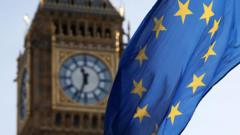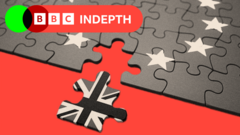The newly established UK-EU agreement aims to strengthen ties post-Brexit, affecting various sectors including food, fishing, youth mobility, border control, and defense, identifying the potential winners and losers from the deal.
UK-EU Agreement: Winners and Losers of the New Deal

UK-EU Agreement: Winners and Losers of the New Deal
A detailed overview of the recent UK-EU agreement post-Brexit, highlighting the key beneficiaries and those at a disadvantage.
In a pivotal development following Brexit, a recent summit in London has resulted in a new UK-EU agreement designed to "reset" relations between the two entities. This comprehensive deal encompasses critical subjects such as defense collaboration, fishing rights, food trade, and enhanced mobility for young people across the UK and EU.
An analysis of the agreement shows distinct winners and losers across various sectors.
**Food Sector**
*Winner:* UK food exporters to the EU potentially benefiting from reduced checks.
*Loser:* Critics of the deal who oppose alignment with EU regulations due to attached conditions.
Since the UK's exit from the EU, food exports have faced increased scrutiny and procedural requirements, resulting in a 34% decline in volumes since 2019. The new agreement proposes a joint food safety accord that may ease these restrictions, provided the UK aligns with EU standards and acknowledges the European Court of Justice's jurisdiction in related disputes.
**Fishing Rights**
*Winner:* EU fishermen gain an extended 12-year agreement for access to UK waters.
*Loser:* UK fishermen who advocated for annual negotiations now face a longer commitment with less bargaining power.
The agreement prolongs access for EU vessels until 2038, compromising UK fishing groups who desire more flexibility. The current arrangement allows EU boats fishing rights in exchange for quotas, but many UK fishermen, including representatives from the Scottish Fishermen's Federation, view this as detrimental.
**Youth Mobility**
*Winner:* Young individuals from both the UK and EU may gain improved opportunities for working and studying across borders.
*Loser:* Opponents of net migration who fear changes in immigration statistics resulting from new mobility schemes.
While the specifics are still unfolding, a proposed “youth experience scheme” could temporarily increase net migration levels, though its long-term effects are projected to be minimal. The plan raises questions amid the UK government's commitment to reducing immigration.
**Travel and Border Control**
*Winner:* British tourists may gain access to eGates in EU airports, promising a smoother travel experience.
*Loser:* Those expecting immediate relief from long wait times at borders may be disappointed, as implementation details remain vague.
The agreement hints at the use of eGates by UK nationals, dependent on the ongoing introduction of the Entry/Exit System, expected later this year.
**Defense Sector**
*Winner:* UK defense industries could see new opportunities through EU funding initiatives.
*Loser:* European firms anticipated revenue increases from defense contracts may face competition from UK companies.
The establishment of a €150 billion EU fund for defense rearmament opens doors for UK firms, suggesting a future integration that might bolster bilateral defense collaborations.
As this landmark agreement develops, its impact will reverberate across industries and stakeholders in both the UK and EU, creating new dynamics in post-Brexit relations.
An analysis of the agreement shows distinct winners and losers across various sectors.
**Food Sector**
*Winner:* UK food exporters to the EU potentially benefiting from reduced checks.
*Loser:* Critics of the deal who oppose alignment with EU regulations due to attached conditions.
Since the UK's exit from the EU, food exports have faced increased scrutiny and procedural requirements, resulting in a 34% decline in volumes since 2019. The new agreement proposes a joint food safety accord that may ease these restrictions, provided the UK aligns with EU standards and acknowledges the European Court of Justice's jurisdiction in related disputes.
**Fishing Rights**
*Winner:* EU fishermen gain an extended 12-year agreement for access to UK waters.
*Loser:* UK fishermen who advocated for annual negotiations now face a longer commitment with less bargaining power.
The agreement prolongs access for EU vessels until 2038, compromising UK fishing groups who desire more flexibility. The current arrangement allows EU boats fishing rights in exchange for quotas, but many UK fishermen, including representatives from the Scottish Fishermen's Federation, view this as detrimental.
**Youth Mobility**
*Winner:* Young individuals from both the UK and EU may gain improved opportunities for working and studying across borders.
*Loser:* Opponents of net migration who fear changes in immigration statistics resulting from new mobility schemes.
While the specifics are still unfolding, a proposed “youth experience scheme” could temporarily increase net migration levels, though its long-term effects are projected to be minimal. The plan raises questions amid the UK government's commitment to reducing immigration.
**Travel and Border Control**
*Winner:* British tourists may gain access to eGates in EU airports, promising a smoother travel experience.
*Loser:* Those expecting immediate relief from long wait times at borders may be disappointed, as implementation details remain vague.
The agreement hints at the use of eGates by UK nationals, dependent on the ongoing introduction of the Entry/Exit System, expected later this year.
**Defense Sector**
*Winner:* UK defense industries could see new opportunities through EU funding initiatives.
*Loser:* European firms anticipated revenue increases from defense contracts may face competition from UK companies.
The establishment of a €150 billion EU fund for defense rearmament opens doors for UK firms, suggesting a future integration that might bolster bilateral defense collaborations.
As this landmark agreement develops, its impact will reverberate across industries and stakeholders in both the UK and EU, creating new dynamics in post-Brexit relations.




















